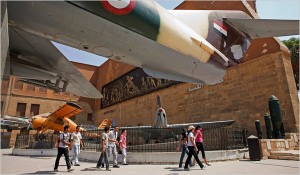Egypt’s military and its next president
 In Sunday’s New York Times I wrote about the Egyptian military’s central role in Egyptian society and what position it might take on the selection of President Hosni Mubarak’s successor. So much is opaque in Egypt’s power structure, and nobody outside Mubarak’s inner sanctum has a clear picture of how anything works, precisely. The retired military officers, opposition leaders, defense consultants, officials, and analysts that I interviewed are either expressing the views of an interested party in the case of the officials and politicians, or are cobbling together theories from a sort of reading of the tea leaves.
In Sunday’s New York Times I wrote about the Egyptian military’s central role in Egyptian society and what position it might take on the selection of President Hosni Mubarak’s successor. So much is opaque in Egypt’s power structure, and nobody outside Mubarak’s inner sanctum has a clear picture of how anything works, precisely. The retired military officers, opposition leaders, defense consultants, officials, and analysts that I interviewed are either expressing the views of an interested party in the case of the officials and politicians, or are cobbling together theories from a sort of reading of the tea leaves.
Even those who believe the military could play an important role have few ideas of how, in practice, the military would exercise that role. Possibilities include:
- A military coup, which most people said was unlikely.
- An expanded role in direct rule, for example by moving to completely shut down the Muslim Brotherhood.
- An internal negotiation with potential successors that protects the military’s continued privileged status
- A tense internal negotiation in which the military does not obtain the assurances it wants, and then seeks to undermine the next president.
- A weak successor who faces a public opinion crisis similar to the uproar in Egypt during the 2008-2009 Gaza war, when Mubarak kept the border closed and essentially sided with Israel over Hamas. In that case, one official source speculated, the military might organize a direct or indirect coup if it fears an ineffective president will be unable to keep domestic order in a time of crisis.
Issandr El Amrani, author of the excellent Arabist blog, gave me a very helpful interview for the story and elaborated further on his blog about the succession prospects. It’s worth reading the whole post, but here’s his thesis:
This situation, in a sense, is ideal for the military, confirming its central role and placing senior military officers — since we are probably talking about that rather than the army as a corporate entity — of winning either way: they will be wooed by Gamal (or any other successor) to support him and, if they decide not to, would easily garner popular support for their own candidate. Should they decide to support Gamal Mubarak, they need do nothing but sit back and allow the process concocted for his “legitimate” election to take place. If they decide against it, it will be most likely a decision taken behind the scenes rather than publicly, with the selection of the candidate taking place in collusion with elements of the ruling party rather than, as some have said, by tanks descending into the streets. A soft coup, if you will, if only because the regime as a whole in Egypt has an interest in preserving the myth of constitutional legitimacy — they would bend the rules, rather than break them altogether.
Stephan Roll, a Berlin-based researcher, also wrote about the military and succession at the Carnegie Endowment’s Arab Reform Bulletin (another version of the essay ran in Al Masry Al Youm’s English edition). He sees the military as a fulcrum point between the ruling party’s old guard and new guard.
For the first time in Egypt’s modern history, the business elite are playing a role in the succession question, but it is still not clear whether that role will be decisive. … So far, the military leadership has kept out of the power struggle between old and new guards inside the party and the government. In general, this neutrality seems to serve the interests of the old guard, as a positive signal by important military officers regarding the new guard and Gamal Mubarak would certainly give them a boost.
As with most of the questions about Mubarak’s successor, the most interesting decisions are likely to be made outside of the public eye, and many of them – like the military’s struggle to maintain its position, or like the ruling party’s internal split between two factions of very rich officials – might take several years to play out. The military has received nearly $40 billion from the United States, which prizes the Egyptian military’s stability and Washington-allied positions. The U.S. also appreciates the Egyptian military’s agreement to stay out of regional affairs, concentrating on defending Egypt’s regime and borders.
The military has much to lose in the transition, these officers and analysts say. Over the years, one-man rule eviscerated Egypt’s civilian institutions, creating a vacuum at the highest levels of government that the military willingly filled. “There aren’t any civilian institutions to fall back on,” said Michael Hanna, a fellow at the Century Foundation who has written about the Egyptian military. “It’s an open question how much power the military has, and they might not even know themselves.”


[…] August and September, all the Egyptians I interviewed about their country after Mubarak ruled out mass protests as even a remote possibility – especially mass protests not organized by […]